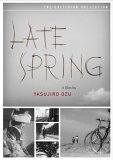
| Cast: | Chisyu Ryu, Setsuko Hara, Hohi Aoki, Masao Mishima, Kuniko Miyake, Haruko Sugimura, Jun Usami |
| Genre: | Drama |
| Director: | Yasujiro Ozu |
| Screenplay: | Yasujiro Ozu, Kogo Noda, based on the novel by Kazuo Hirotsu |
| Cinematography: | Yuharu Atsuta |
| Composer: | Senji Ito |
| Runtime: | 108 minutes |
Every time I watch a work by Yasujiro Ozu, I don't feel like I'm watching a film but instead a documentary on Japan's middle and lower class' life. His works lack a manipulative plot, instead substituting the actions that take place in every day life. The attention to detail is extreme from the way the actors are dressed to how they show (hide) emotions to the interiors. Ozu portrays Japan in a better and more accurate way by conveying images of life in the country rather than forwarding a story. Banshun is about devotion to the deep relationship between a father and his daughter. It is also about the importance that "common belief" and society have in Japan.
Noriko (Setsuko Hara) lives with her father (Ozu's veteran Ryu Chisyu), a widower who spent his life studying while leaving the role of "housewife" to his daughter. The environment in which she grew up in, with a great deal of attention and love from her father (trying to balance off the loss of her mother) provides her with all the love she needs. She has, in fact, a great relationship with her father. It's not all patriarchal, but instead based on faith and understanding. Her father Shukichi is a good man, honest and loving. It seems like everything is perfect in Somiya's house; the only problem is, although it doesn't seem to bother Noriko, Shukichi realizes she's still unmarried.
One day, an old friend of Shukichi pays him a visit to give him news that he just remarried. Onodera-san asks Shukichi if Noriko was married yet, and is surprised to find out she isn't. He reminds him about his duty to let Noriko leave the house and experience her life as a wife. Shukichi's sister, entering the conversation, suggests that a good candidate for Noriko's hand would be Shukichi's assistant Hattori. He's young, intelligent, gentle, and of good spirits.
After spending an afternoon together with Hattori, Noriko is asked by her father what she thinks about him, if she'd picture him as a good husband. She certainly would be interested, but confesses that he's already engaged. Hearing the news, her aunt Masa proposes a new "prospect," a young student who seems to resemble Noriko's favorite actor Gary Cooper. She goes so far as to lie, saying that she'd be the "matchmaker" for Shukichi's upcoming marriage with a young widow named Mrs. Miwa. This is obviously not the case, but Shukichi is so pressed by his social "duty" that he keeps the deception alive to help Noriko make her choice and marry the young prospect. He knows that she'll take a husband if she believes her father won't need her attention because he'll get attention from his new wife.
What was once an ever smiling, happy, and excited Noriko is transformed into a sad caricature of her former self. Noriko slowly realizes that she has to move on with life, leave her father. This makes her terribly sad, but she decides to go on and marry, to make her father proud and fulfill her (and his) social duty. The last scenes are both beautiful and moving, when father and daughter realize they've got to leave each other even though they regret it.
The sheer beauty of this film lies in its simplicity. It shows the inner beauty of everyday life, the simple and loving relationship between a father and his daughter. We understand how the codes of society can be brutal at times, how LIFE can be brutal at times. This is done gradually, without any manipulation or major event that causes Noriko to rethink, to change her vision. Like the Late Spring, Noriko realizes too late what she has to do. Even if it's painful, she decides to go through with it because ultimately she loves her father and respects him too much to give him displeasure. She wants to see him happy, and finally decides to go on with life.
Late Spring is as honest as they come. It's an uncliched look at life, relationships, and how they evolve. It accomplishes its goal without any overly dramatic tearjerking scenes. The mood is lighthearted, but gradually turns sad when we realize with them that there's no escape from the social "trap" of marriage. Conformism is a duty in this kind of society.
The film features the incomparable style of every Ozu production, with minimal movement and action, but great focus on emotions, both facial and vocal. The actors portray happiness and sadness in such a believable and effective way. Setsuko Hara is particularly excellent in this regard, having light in her face and smiling, but gradually and believably showing how it can turn to tears. Ryu Chisyu is reliable as always, showing the warm and worried side of a loving father. The tremendous realism and the honesty it's presented with makes this film one of Ozu's best works, and one of the best societal portrayals of love, devotion to family, separation, and the passage of time. Beautiful in its simplicity.
    |

|
|

|
|
|
|
|
|
|
|
|
|
|
|
|
|
|
|
|